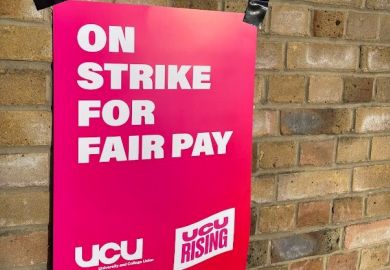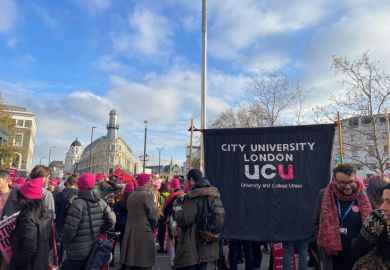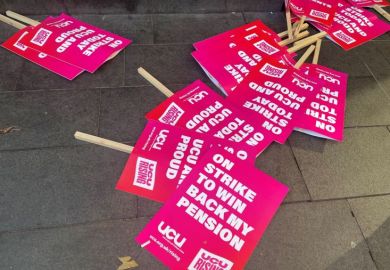Union members have expressed doubt that a forthcoming UK sector strike ballot will reach the minimum turnout threshold, and lamented that the vote has jeopardised progress on other workplace issues.
The University and College Union’s higher education committee (HEC) voted earlier this month to hold the ballot in the new year after 53 per cent of union members who participated in a consultative poll said that they would be prepared to take industrial action in response to employers’ pay offer of a 2.5 per cent minimum rise.
But Duncan Adam, a senior lecturer in Manchester Metropolitan University’s business school, described the move as a “leap of faith”, given the consultative ballot only achieved a 27 per cent turnout
Strike laws, which Labour had promised to repeal but has yet to take action on, require formal strike ballots to receive a minimum turnout of 50 per cent, something which UCU failed to achieve last year when it last voted on strike action.
“Based on a turnout of 27 per cent, I would be very sceptical that it would get anywhere close to that threshold,” Dr Adam said.
Instead, Dr Adam anticipated that the ballot would result in a “hardening” of people’s positions, and “those people who do not support action will simply not vote”, resulting in a majority in favour of action on a low turnout, a position echoed by others in the sector.
Almost 90 UK universities have now announced plans for restructures or redundancies as the financial crisis in the sector worsens, and union members warned that the strike ballot may hamper local branches’ efforts to combat job cuts.
Raj Jethwa, chief executive of the Universities and Colleges Employers Association (Ucea), has written to UCU general secretary Jo Grady to confirm that the decision to ballot for strikes meant that institutions were no longer prepared to work jointly with unions on a review of the pay spine and a range of other concerns, including workload issues, contract types and equality pay gaps.
Dyfrig Jones, senior lecturer in film at Bangor University and a HEC member who voted against holding a strike ballot, said that the union had made a “small step” on long-hoped-for action on casualisation, stress and working hours by agreeing terms of reference for these discussions with Ucea, but “even that small step now has been lost because of the ballot”.
“This has set that back by at least another six months, maybe a year. I honestly don’t know now when we can expect to be back at the table discussing these vital and important issues,” he said.
The mood among union members was one of “fatigue” after successive years of declining sector standards and industrial action, said Dave Hitchcock, a lecturer in early modern history at Canterbury Christ Church University.
“Members are facing mass redundancies right now. Striking on a pay claim seems to me completely tone-deaf and out of touch with the sector’s present conditions,” Dr Hitchcock said, adding that he did not believe that the ballot will reach the threshold.
“Members of the union, including myself, are quite tired, and we’re looking at very difficult local situations in our workplaces. We’ve been out on industrial action in one variety or another for quite a long time, year after year. These things combine to create a sense of fatigue about industrial action.
“Not that that doesn’t mean that people aren’t willing to do it; it just means that the barriers to overcome to get people to do it are higher right now.”
Instead, branches currently need resources to focus on local disputes, and “this takes away from that”, Dr Hitchcock said.
Register to continue
Why register?
- Registration is free and only takes a moment
- Once registered, you can read 3 articles a month
- Sign up for our newsletter
Subscribe
Or subscribe for unlimited access to:
- Unlimited access to news, views, insights & reviews
- Digital editions
- Digital access to THE’s university and college rankings analysis
Already registered or a current subscriber?







